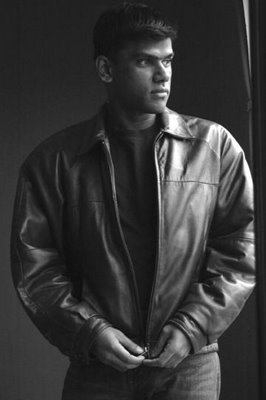Speakers: GLBT Asians do exist By Tom Keane (From Boston College new magazine BCheights)
I am so priviledged to be part of this panel discussions. I am posting the new article for everyone to see. :)
From the Article
"I've tried to come out to my friends in India and they deny it. They say you're not gay, you can't be gay," said Sarav Chithambaram, a software engineer and panelist at "Asians Can't Be Gay?! The Silent Struggle." The panel discussion was presented by the GLBT Leadership Council (GLC) and the Asian Caucus Thursday.
The panel featured four speakers, Sarav Chithambaram, Kristin Ming, a local engineer, and BC professors Min Hyoung Song and Ricco Siasoco. All four are of Asian descent and consider themselves members of the GLBT/Queer community.
The panel discussed the position of Asians within the larger GLBT/Queer community. The panelists and the student organizations that organized this event sought to correct the false assumption that Asians rarely deviate from a heterosexual lifestyle.
The presentation began with a short film which briefly interviewed members of the Asian and GLBT/Queer communities here at BC. In the film, BC students were asked if they knew any Asian members of the GLBT/Queer community and what their thoughts were about Asians "coming out."
The four speakers were then introduced to the audience, and each panelist spoke briefly about their experiences as Asian members of the GLBT/Queer community. After they were introduced, the panelists answered questions asked by the moderator, Myhanh Tran, president of the Asian Caucus and LSOE '07, and members of the audience.
The panelists all stated that they did not choose to be attracted to the people they are attracted to, they have always had feelings, which some might consider not "normal."
"Being gay is a part of me, but not who I am fully," said Chithambaram.
The panelists did point out that they did not believe that being members of the GLBT/Queer community was the sole defining aspect of their lives. Siasoco said, "Being gay is different in my professional and personal lives." Other panelists agreed with him on this, making it clear that they considered themselves to be much more than just members of the GLBT community.
The issue of race was discussed at length by the panel. "The gay community in the United States is not free from racism and there is tension there," said Song.
The panelists made it clear that Asians are highly visible in the GLBT/Queer community, something of a minority within a minority. While they have all become friends with Caucasian members of the GLBT/Queer community, they have experienced racism from other members of this group.
"It's nice to assume that all members of the GLBT community, having experience prejudice, are accepting," said Kristin Ming, but that is unfortunately not the case many times.
The panelists did express hope that prejudices against Asians in the GLBT/Queer community, and against the GLBT/Queer community as a whole, can be overcome. They stated that they were excited to be involved in this panel, because it created an opportunity for dialogue on this discussion.
Another major issue the panelists discussed was how members of the GLBT/Queer community are viewed by other members of Asian culture. They pointed out that this is a more complex question than many realize, due to the vast differences of culture and tradition among Asians of different nationalities. This can lead to a wide range of responses when an Asian comes out to his or her family.
Many Asians in the GLBT/Queer community believe that it is safer to come out in the United States as opposed to Asia. They believe that the environment in America is much more accepting and open than in Asia. The panelists said that idea has merit, but at the same time it might be somewhat inaccurate in how it views the opinions of homosexuality in Asia.
"In a lot of [Asian] cultures, homosexuality was well integrated," said Song.
The panel said that Western influence helped make homosexuality taboo in Asia. Chithambram pointed out that India's Kama Sutra has several chapters devoted to homosexuality and that homosexuality has a long history in that country.
Panelists pointed out that that attitude has changed, and the West has played a major role in that change. Now, Asians are rarely thought of when people consider the GLBT/Queer community. Members of the panel claimed that most people think of homosexuality as a "white thing." This has been detrimental to the establishment of a complete understanding of the GLBT/Queer community in society as a whole.
A major obstacle to increasing awareness about Asians in the GLBT/Queer community is the lack of role models for Asians in that community. They stressed the idea that Asians, as well as other minorities, are just as likely to be homosexual as whites. They hoped that events such as this could help raise awareness of Asians in the GLBT/Queer community.
They also recommended several support groups in the area, such as QAPA (Queer Asian Pacific Alliance), MASALA (Mass Area South Asian Lambda Association), and Rainbow Cambridge, for GLBT Asian students who might be searching for such groups.
Friday, January 26, 2007
Subscribe to:
Post Comments (Atom)


No comments:
Post a Comment